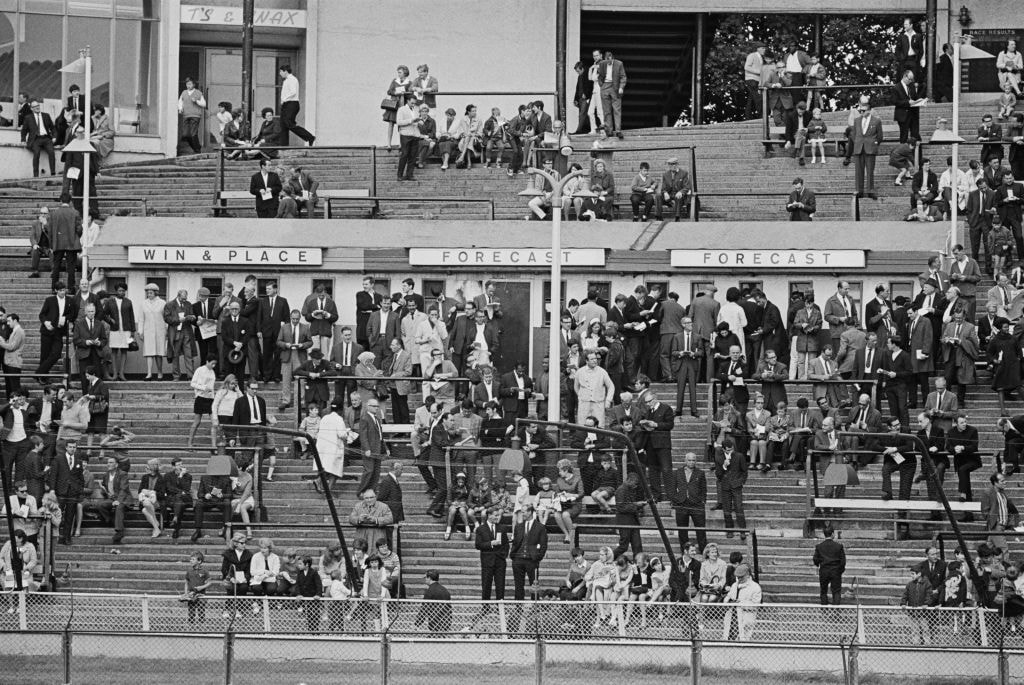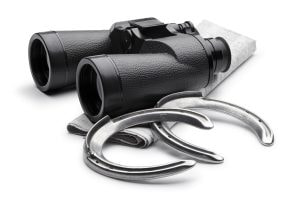Gamble Landed! Greyhound Racing’s Biggest Betting Coups
The Yellow Sam betting coup, orchestrated by Barney Curley, is undoubtedly the most famous of all successful gambles in horse racing history. Courtesy of newspaper articles, books and documentaries, the story behind the plot, executed at Ireland’s Bellewstown Racecourse, has become part of gambling folklore.

Curley hit the headlines again in 2014 when he was behind a series of multiple bets placed on four horses, all returning from a significant layoff, trained by individual trainers. When they all won – at ever-diminishing odds – bookmakers were relieved of an estimated £2 million.
But coups, successful or otherwise, have been part of gambling’s fabric for decades. And, more often than not, they have come with a degree of mischief. Here, you can read about three of greyhound racing’s biggest gambles that did – and did not – fleece the bookmakers.
Beating the Tote by Backing Five
In May 1961, betting shops became legal in the UK. By today’s standards, the newly independent high street operators had to observe what would now be described as some ‘pretty strange rules’. They were designed to give punters all of the options open to them on racecourses. However, they left off-course layers wide open.
In 1964, a group of unknown punters saw and attempted to exploit one such loophole with a betting coup at London’s Park Royal Greyhound Stadium. The gamble took place on the afternoon’s first race, and saw large bets placed on five runners in the contest at betting shops across the capital and the home counties.
Morris Bookmakers at Park Royal greyhound track in 1956 pic.twitter.com/CtooXFVdnz
— Sports & Betting History by BestBettingSites (@CDCHistory) January 16, 2019
Written on all slips were the words ‘tote odds’. It meant that regardless of the official starting price, any winning bets had to be aligned to and paid to the official tote dividend. By lunchtime, bookmakers in the UK sensed something was amiss and declined further bets on the race.
At the track, the only greyhound not backed was withdrawn by management on technical grounds (in this case, a weight variation), and a reserve was introduced to run in its place. It appeared authorities believed this would address any foul play at hand.
However, they did not account for this reserve runner attracting £400 in tote bets – the equivalent of £10,000 in today’s money. As a result, every runner in the contest – except the reserve – would return a double-digit win dividend.
The unbacked reserve did not win. Instead, the contest fell to a greyhound who returned on 9/2 odds with on-course bookmakers. However, thanks to the manipulation, the winning dividend on the tote was 22/1, which is what odds off-course bookmakers were forced to pay.
Blocking Windows to Corner a Market
The seed for Barny Curley’s Yellow Sam betting coup was probably sown a decade before it was executed and was influenced by the Dagenham Coup, which hit the headlines in 1964. This gamble remains one of greyhound racing’s biggest stories, as it was a perfectly orchestrated and executed betting coup.
Its mastermind, an individual called John Turner, was praised for his ingenuity by Mr Justice Paull when he was found not guilty of ‘unlawful conspiracy’. Furthermore, he described the coup as “brilliantly successful” and drew an analogy with city trading – when dealers attempt to “corner the market”.
Sadly, the judge also criticised the law for failing to allow Mr Turner to claim against bookmakers that refused to honour his winning bets. Indeed, when the correct greyhounds passed the line in front, the National Sporting League and the National Association of Bookmakers suspended payouts. It later declared “events are null and void” and advised all its members to return stakes and pay no winnings.
How Did the Dagenham Coup Work?
Similar to happenings at Park Royal, the tote returns were central to the Dagenham Coup. However, this time, instead of loading the tote with fortunes, Turner and an associate, Leslie Carey, employed individuals to block the track’s 31 tote windows. They had instructions to slowly place forecast bets on the race in question and, therefore, not allow regulars to place any bets on the targeted race.
From the moment windows opened until the race started, wagers were placed on any one of the two no-hopers to fill a forecast spot. Meanwhile, in betting shops around London, another crew placed forecast combination bets involving the four other greyhounds in the race. A four-dog forecast combination consists of 12 individual bets/outcomes.
Turner and Carey’s crew had successfully placed every bet on the tote in the race in question. However, while forecast bets involving the no-hopers carried hundreds of pounds, the 12 forecast combinations involving the four fancied greyhounds had a single four-shilling one-unit bet on them.
When a greyhound called Buckwheat crossed the line ahead of Handsome Lass (with the no-hopers duly finishing well beaten), a tote forecast dividend of £987 was declared to a 10-pence (two shillings) wager. Off-course bookmakers faced ruin with successful bets due to be settled at odds in excess of 9,200/1 (after tax).
Dagenham greyhound track, 1964 pic.twitter.com/eQcMI93aTg
— Sports & Betting History by BestBettingSites (@CDCHistory) January 11, 2019
£12 Million Reasons to Withhold Payment
The total won was declared to be £600,000 – equivalent to £12 million in today’s money. However, events dragged through the courts, and outraged bookmakers could not be forced to pay out the gamble’s orchestrators.
Legal costs incurred by the track owners – whom five bookmaking firms, Ladbroke, Coral, William Hill, Jack Swift and Arthur Stanley, attempted to sue for failing to operate their tote correctly – were awarded to Dagenham. The judge ordered Turner’s one winning ticket worth nearly £2,000 (all of which was Turner and Carey’s stake money) had to be honoured by Dagenham Stadium.
In later years, Turner and Carey, who never received any of their winnings, resorted to making complaints and objections to local authorities, asking for the bookmaker licences of non-paying shops to be revoked.
A Marathon Not a Sprint, at Rochester
Rochester Greyhound Stadium closed in 1979; it had raced for 43 years and came to the public’s attention just a year before the starting traps flashed open for the final time. The reason for its sudden fame was an off-course gamble that yielded between £300,000 and £400,000 (over £2 million in today’s money).
Off-course bets involved four selections: a runner at Walthamstow, a runner at Romford, and two at what was described as a ‘provincial track’, Rochester. The happenings at the Kent track were bizarre, to say the very least.
A London company, Viola Coaches, had stepped forward to sponsor an open race competition at Rochester. They named it the ‘Long and Short Trip Stakes’ and, to be in keeping with its business, it was agreed the competition would involve two runs over contrasting distances on the same night.
The heats would be two races staged over a two-bend 277-metre distance. The first three greyhounds’ home in these sprint races would contest a marathon 901-metre race just hours later. This bizarre format saw only three visiting greyhounds, with the remaining nine dogs being locally trained.
Form in the Book but Not on the Card
Amongst the visitors, owner/trainer Jack Purvis entered two greyhounds that he had bought from Ireland, Leysdown Pleasure and Leysdown Fun. Leysdown was Purvis’s prefix (named after the village where he once owned a betting shop). Both greyhounds had an official name change after they had left Ireland, where, months beforehand, they had winning form over sprint distances.
Leysdown Pleasure, previously called Rathsaker Stuart, had won a 300-yard race at Newbridge, clocking a time just 0.10 seconds shy of the track record. Leysdown Fun, previously called Band Major, had won a 360-yard sales trial at Dublin’s Shelbourne Park, recording the fastest time of the day.
With the smart Irish form not on Rochester’s race card and only moderate trial times over four-bends at Rye House and Ipswich on display, local punters showed little interest in either greyhound. The crowd was muted when Leysdown Pleasure, who drifted from 8/1 to 33/1, made all to beat the 8/11 favourite. Shortly afterwards, Leysdown Fun also scored, returning at odds of 4/1.
In the final, Leysdown Fun was withdrawn due to injury, and Leysdown Pleasure, with limited stamina, finished a well-beaten last. This result mattered little as a massive coup had already been landed unbeknown to the bulk of racegoers and track management.
Rochester – the Kent track closed in 1979 pic.twitter.com/yVNMqZvb4C
— Sports & Betting History by BestBettingSites (@CDCHistory) February 8, 2019
Bookies Refuse to Pay Winning Bets Again
News broke of the coup involving the Rochester winners and those at Romford and Walthamstow days later. It transpired doubles and trebles on all four greyhounds had been placed in betting shops around the country, and winnings from these bets totalled hundreds of thousands of pounds.
Trainer Jack Purvis immediately went on the record declaring: “I only had a £10 win double on my two and was flabbergasted to see Leysdown Pleasure go off at 33/1, 4/1 about Leysdown Fun seemed about the right price.”
The Bookmakers Off-Course Licensees Association (BOLA) advised their members not to pay pending inquiries into the matter. Three weeks later, the NGRC (National Greyhound Racing Association) did hold an enquiry into the Rochester races and declared: “Evidence submitted from the Rochester stewards and the local stipendiary steward dictates that there was no breach of the rules of racing.”
BOLA’s members, such as Corals (declaring a £25,000 loss), Victoria/Sporting Club (£25,000) and Ladbrokes (£50,000), continued to withhold payment. Things became complicated when Brian Ingamells, a bookmaker with a chain of shops in the Leicester area, stated numerous bets were struck in his shops by “a manager from one of the big four.”
He stated, “I think it snow-balled around the country. Once someone in the know revealed that Leysdown Pleasure and Fun were very good sprinters back in Ireland.” His words did little to help, although those with winning slips had an exponent in the shape of John McCririck, later known as a presenter on Channel 4 Racing.
Judge Agrees Bookmakers Are Not Obliged
In 1978, McCririck was voted the ‘Specialist Writer of the Year’ at the British Press Awards. In 1979, he was awarded the ‘Campaigning Journalist of the Year’ distinction. Much of his work at this time included championing the moral rights of the ‘Rochester winners’. He openly questioned how winnings could be withheld when no impropriety had taken place.
Although no rules had been broken, BOLA continued to tell its member bookmakers to withhold payment for years. An inevitable legal case ensued. It was not until 1985, seven years after the greyhounds had won, that a judge agreed that bookmakers were not liable to pay out on the winning bets.



